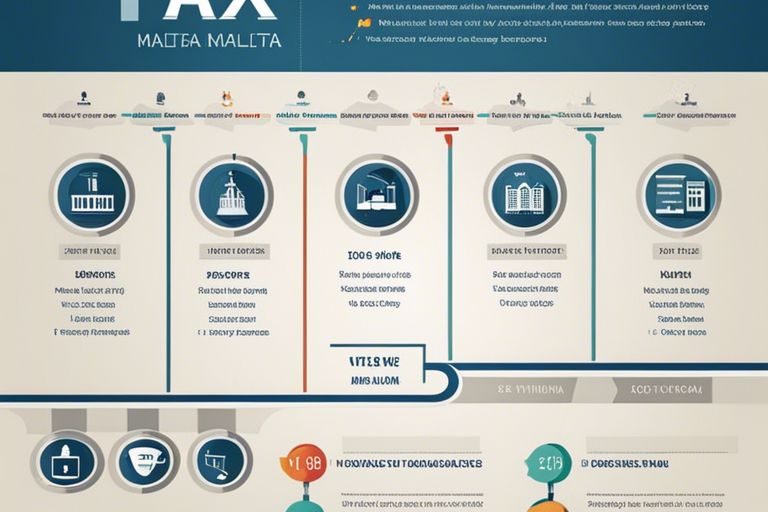Malta's Tax News – Key Updates for Businesses

It’s crucial for businesses in Malta to stay informed about the latest tax updates to ensure compliance and optimize their financial strategies. In this blog post, we will highlight key changes in Malta’s tax laws that may impact businesses, including new regulations, incentives, and potential risks to be aware of. Stay ahead of the curve and maximize your tax efficiency by staying up to date with the latest developments in Malta’s tax landscape.
Overview of Malta's Tax System
Corporate Tax Structure
To understand Malta’s tax system, organizations must grasp the corporate tax structure. On a broad scale, companies operating in Malta are subject to a corporate tax rate of 35%. However, various incentives and exemptions are available for businesses, which can significantly reduce the effective tax rate. Malta’s tax system also offers a flat rate of 5% for companies engaged in international trading activities or licensed financial institutions, making it an attractive destination for businesses seeking tax efficiency.
Value Added Tax (VAT)
To probe deeper into Malta’s tax framework, businesses need to consider Value Added Tax (VAT). Overview: The standard VAT rate in Malta is 18%, with reduced rates of 7% and 5% applicable to specific goods and services. Structure: VAT registration is mandatory for businesses with an annual turnover exceeding €35,000. It is crucial for companies to comply with VAT regulations to avoid penalties and ensure smooth operations in Malta’s tax landscape.
Recent Legislative Changes
Amendments Impacting Tax Rates
Now, let’s research into the recent legislative changes in Malta impacting tax rates. The government has introduced new amendments that are set to affect the tax rates for businesses in the upcoming fiscal year.
Updates on Tax Incentives and Credits
Impacting the landscape of tax incentives and credits, recent updates have been implemented to encourage businesses in Malta. These changes aim to provide more opportunities for businesses to benefit from tax relief and support economic growth.
Another significant update includes the introduction of increased tax credits for businesses that are investing in renewable energy projects. This is a positive step towards promoting sustainability and reducing carbon emissions in Malta. Businesses can now benefit from double the tax credits previously available, incentivizing them to make environmentally friendly investments.
Compliance and Reporting Requirements
New Filing Deadlines
Requirements: If you are a business operating in Malta, it is crucial to stay informed about the latest filing deadlines to ensure compliance with tax regulations. Failure to meet these deadlines can result in penalties and fines, so it is imperative to be proactive in meeting your obligations.
Digital Reporting and E-Filing Systems
The Maltese government has implemented digital reporting and e-filing systems to streamline the process of submitting tax information. These systems offer convenience and efficiency to businesses, allowing them to submit their reports electronically without the need for paper forms. It is mandatory for businesses to use these systems for accurate and timely reporting.
Reporting your tax information through digital systems not only saves time and effort but also reduces the risk of errors associated with manual data entry. It enables real-time tracking of your submissions and ensures that your business remains compliant with tax laws.
International Tax Considerations
Double Taxation Agreements
On the international front, one of the key considerations for businesses in Malta is navigating Double Taxation Agreements (DTAs). These agreements are crucial in avoiding the issue of being taxed on the same income in multiple countries. By leveraging DTAs, businesses can benefit from reduced withholding tax rates on cross-border transactions and ensure they are not subjected to double taxation.
EU Tax Directives and Compliance
Considerations around EU Tax Directives and Compliance are paramount for businesses operating in Malta. Adhering to the various EU tax directives ensures compliance with European Union regulations, impacting areas such as cross-border transactions, tax optimization, and transfer pricing. Failure to comply with these directives can result in severe penalties and reputational damage for businesses.
Conclusion
Ultimately, staying informed about Malta’s tax news and key updates is crucial for businesses to ensure compliance and make strategic financial decisions. From changes in tax rates to new regulations impacting various industries, being up-to-date with the latest developments can help businesses navigate the complex tax landscape in Malta. By staying informed and seeking professional advice when needed, businesses can effectively manage their tax obligations and optimize their financial performance in the ever-changing business environment.
Recommended Posts

Financial Aspects of Doing Business in Malta
July 26, 2024

The Rise of Digital Banking Solutions in Malta
July 24, 2024




